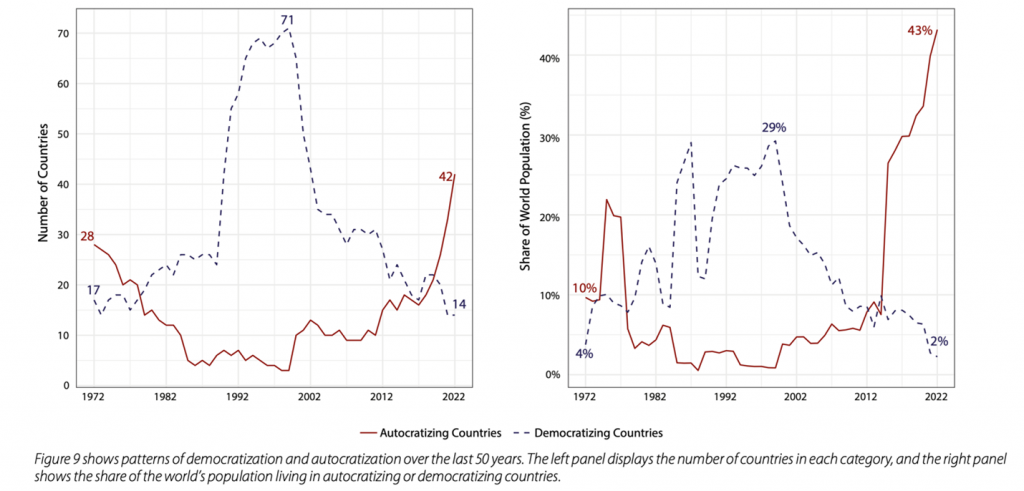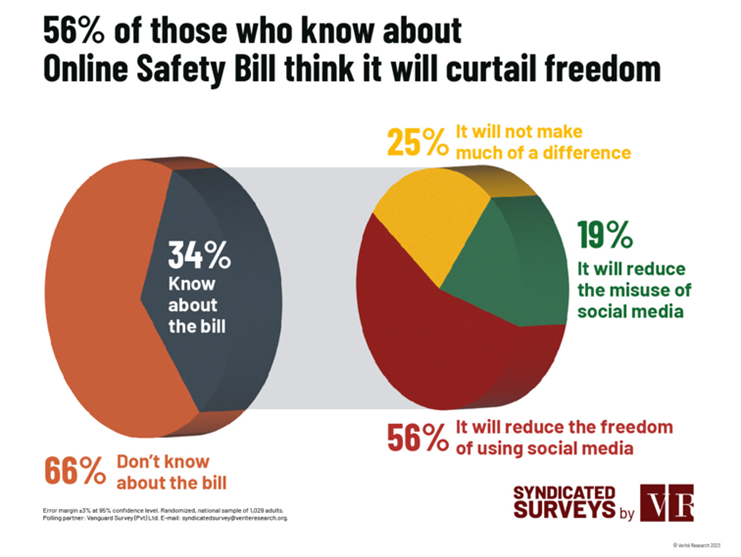Online Safety Bill & Operation Justice: Sri Lankan Democracy under Attack

“Life, if you looked about you, bore no resemblance not only to the lies that streamed out of the telescreens, but even to the ideals that the Party was trying to achieve.” – George Orwell, 1984
In today’s world, freedom of expression is deteriorating in many nations. The V-Dem Democracy 2023 projects this trend (see graph); only 13 percent of the world’s population lives under a liberal democracy, and 44 percent under an electoral autocracy. The trend applies to the caretaker regime established by a one-seat member of parliament in Sri Lanka, President Wickremasinghe. Sri Lanka’s Ministry of Public Security has become the ‘Ministry of Truth’, just like in the Orwellian dystopian novel Nineteen Eighty-Four. The main task of the Ministry of Truth is to correct the record of all information that’s not appealing to the Government. With its five-member commission, the new Online Safety Bill [OSB] in Sri Lanka will decide the content and is the latest tool for truth-seeking. The offenders will be imprisoned for five years or fined.

Credit: V-Dem, Democracy Report 2023, https://v-dem.net/documents/30/V-dem_democracyreport2023_highres.pdf
Sri Lanka’s Anti-drug Operation
One step in the right direction was Sri Lanka’s newfound commitment to preserve a rules-based order in international waters by deploying a navy vessel to join the U.S.-led coalition against Houthi rebels. At the same time, two steps were taken in the wrong direction in the domestic arena: to suppress freedom of expression through an Online Safety Bill [OSB] and completely reject the UN human rights concerns over the anti-drug crackdown, ‘Operation Yukthiya [Justice]’. The sincere effort to commit to norms and values for a rules-based international order along with the West is washed out by draconian domestic policies to crush individual freedom.
Both subjects relate to the Ministry of Public Security, where its Minister, Tiran Alles, is wrapped in controversies from holding offshore accounts revealed by the Pandora papers to funding the one-time terrorist organization LTTE to refraining from voting in the democratic elections orchestrating the defeat of Ranil Wickremasinghe in 2005. The main suspect, Emil Kanthan, in Minister Alles’s terrorist funding case, was removed from the proscribed terror list a few months ago. What’s more concerning is Alles’s newfound adventure to suppress democracy in the island nation.
According to UN experts, there is a heavy security-driven approach to Sri Lanka’s drug response, where clear abuse of human rights is documented. UN experts warned them to suspend and review ‘Operation Yukthiya (Justice)’ immediately. According to HRCSL, there were reports of cruel, inhuman, or degrading treatment during search operations conducted by Sri Lanka’s Police. “These reports are particularly egregious in a context where the Commission has received over 200 complaints of torture in 2023 alone”. Minister Alles bluntly rejected the UN letter at a public event, justifying that his policy was to protect women and children. Many civil society actors, including the Internal Commission of Jurists, have voiced their concerns about the ongoing human rights violations. Among diplomats, U.S. Ambassador Julie Chung has warned the ongoing police operation to “uphold the principles of the rule of law and due process”.
Online Safety Bill
Sri Lankan lawmakers have also passed the new ‘Online Safety Bill’ (OSB) introduced by Alles. The Bill proposes jail terms for content that a five-member commission considers illegal and makes social media platforms liable for such content on their platforms. Minister Alles said the OSB “seeks to address problems related to online fraud, abuse and false statements that threaten national security and stability…laws are necessary to deal with offences committed online, noting that last year more than 8,000 such complaints were filed with police related to sexual abuse, financial scams, cyber harassment, data theft and other offences.” Unfortunately, the government has not done enough to justify the need for its intervention to regulate the online space. The crafted regulatory framework will be counterproductive and undemocratic. The Supreme Court found 31 of the 57 clauses to be unconstitutional.
Already, many leading social media companies have raised their concerns. The bill was clearly passed to suppress the voices against the Rajapaksa family that still exist and who have been targeted systematically since the 2022 uprising. The present majoritarian Rajapaksa political party ensures the survival of the current President Wickremasinghe and enable his draconian laws to crush dissent. Sri Lanka will have elections this year in this undemocratic space created by the autocratic rule in the country. A Sri Lankan journalist speaking to this author on the new bill said, “No matter what the government try to do now, they will fail; people have already decided”. But, undoubtedly, the online regulations to crush dissent will be a weapon for the government during the elections. The systematic approach of limiting freedom of expression through the legislature attempts to create their own Panopticons [individual prisons] restricting individual freedom to sustain the autocratic regime in power.
The World Economic Forum Global Risk Report 2024 identifies mis- and disinformation as the top short-term global risks. The report also accurately assesses that the risk of domestic propaganda and censorship will also rise. In response to mis- and disinformation, governments could be increasingly empowered to control information based on what they deem “true”. Countries such as Sri Lanka, with a heavy police state established after the uprising in 2022, have transferred their information space to the government in the guise of national security. A statement released by the Center for Policy Alternatives (CPA), a reputed think tank in Sri Lanka, reads, “It is unfortunate that the present Bill’s concern regarding online safety is in name only. The Bill represents the latest attempt by the Government to introduce laws that expand the powers of the executive arm of Government with limited safeguards and wide scope for abuse.” Further, the CPA highlights the vague and broad terminology of the Online Safety Commission by the President with its expansive powers and the severe restrictions placed on the freedom of expression on social media.

Source: Verité Research, https://www.veriteresearch.org/2024/01/24/colombo-online-safety-bill-impact-survey-2023/
According to a recent poll conducted by Verite Research, another think tank in Colombo, 56 percent said it would ‘reduce the freedom of using social media’. The Freedom of the Net measured by Freedom House ranked Sri Lanka in 2023 as partially free at 53 because the authorities did not block social media platforms during mass anti-government protests. This score will change in 2024 with the restrictive measures imposed by the Online Safety Bill.
This will impact Sri Lanka’s democratic image and see international rankings gradually shifting towards an electoral autocracy. The nation was declared bankrupt in 2022, and many democratic nations and liberal institutions that supported Sri Lanka’s stabilization and recovery will be concerned about the ill-liberal domestic policies being implemented to suppress democracy. Sri Lanka urgently requires not a police state to crush dissent or protect government propaganda through its ‘Ministry of Truth’ but to empower individuals and strengthen its institutions to safeguard democracy.